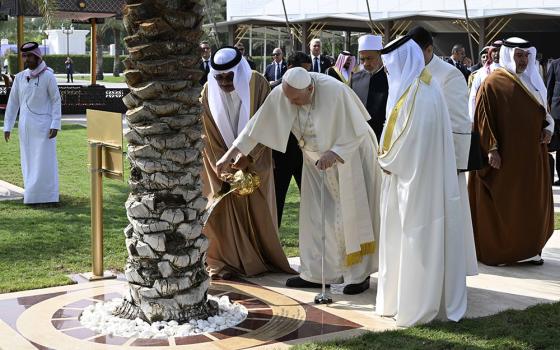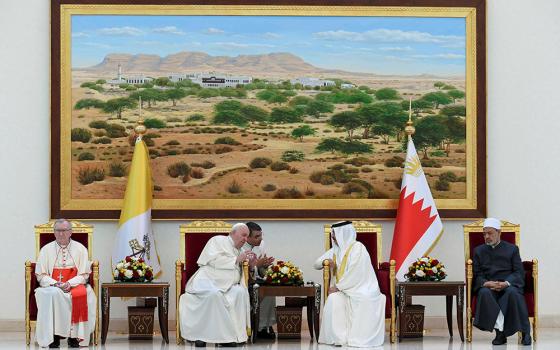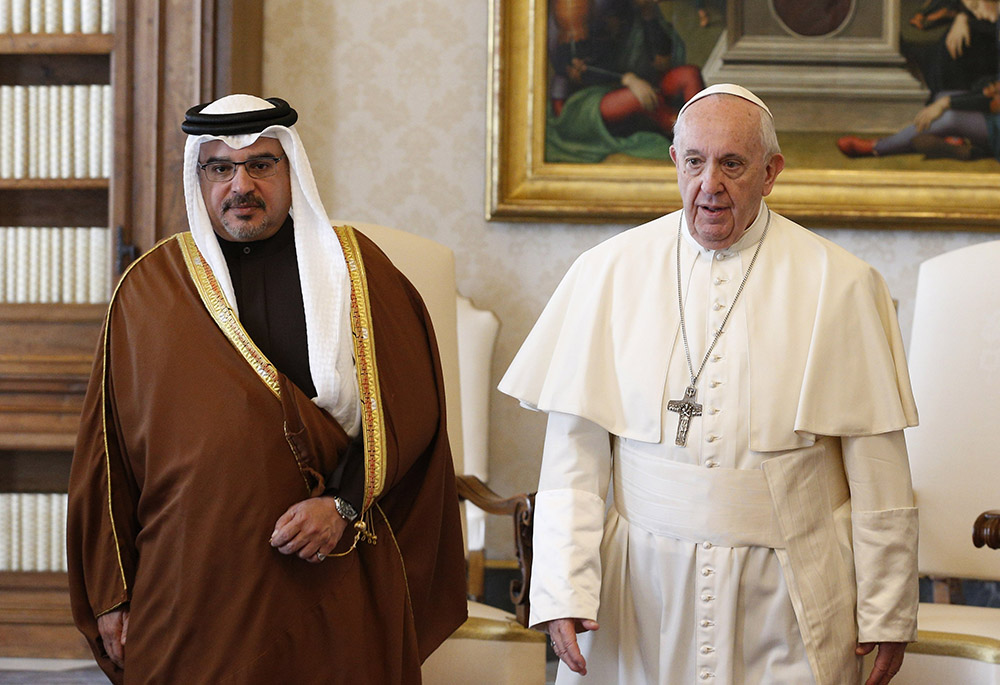
Pope Francis walks with Salman bin Hamad Al Khalifa, crown prince of Bahrain, during a private audience at the Vatican in this Feb. 3, 2020, file photo. The pope's visit to Bahrain Nov. 3-6 will make him the first pope to visit the archipelago nation in the Persian Gulf. (CNS/Paul Haring)
When Pope Francis becomes the first pontiff to ever set foot in Bahrain during his upcoming Nov. 3-6 visit to the Persian Gulf kingdom, in many ways, it will be a journey that began not in Rome, but five years ago with his 2017 visit to Egypt.
It was there, at an international peace conference hosted by Al-Azhar — at what is considered the most authoritative theological institution in Sunni Islam — that Francis cemented his friendship with its grand imam, Sheikh Ahmad el-Tayeb.
A photo of the two men embracing cheek-to-cheek went viral in the Middle East as an "icon of hope." Two years later, in February 2019, Francis became the first pope to travel to the Arabian Peninsula, where he and el-Tayeb signed a document on "Human Fraternity for World Peace and Living Together," which has been widely heralded as a major advancement in the Catholic Church's relationship with the Muslim world.
In September, Francis was joined by el-Tayeb for a meeting of interfaith leaders in Kazakhstan that adopted the "Human Fraternity" document. Now, less than two months later, the duo will meet again at the "Bahrain Forum for Dialogue: East and West for Human Coexistence," where Francis will offer the closing address on Nov. 4 to the estimated 200 interfaith leaders gathered in the nation's capital city of Manama.
"The fact that a simple friendship is at the heart of their major initiatives is very profound and it is a model for the rest of us," said Jordan Denari Duffner, a scholar of Muslim-Christian relations.
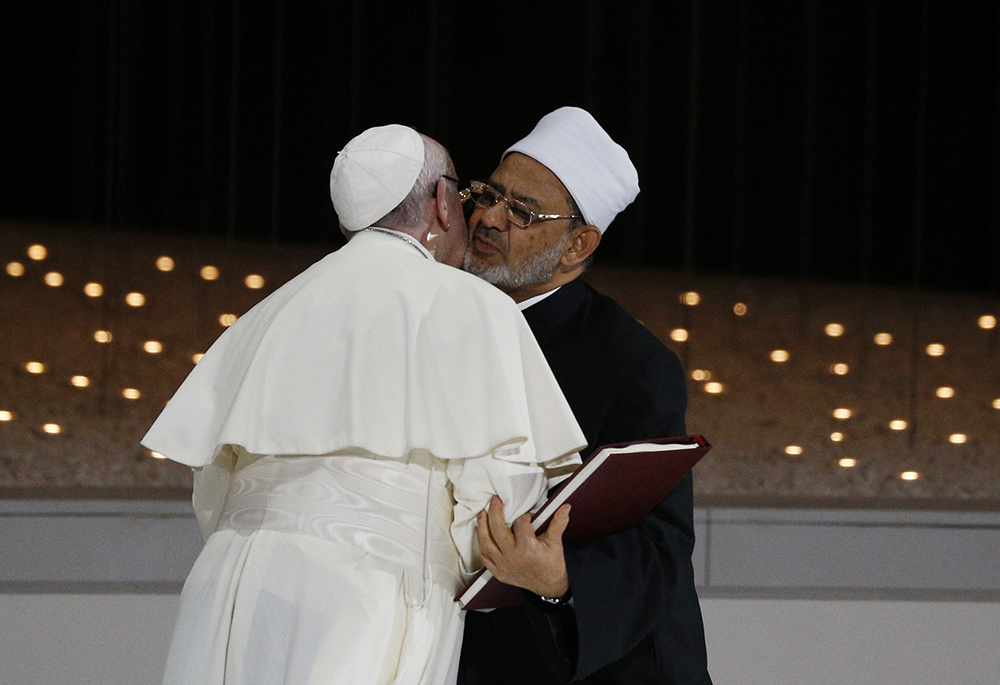
Pope Francis and Sheikh Ahmad el-Tayeb, grand imam of Egypt's Al-Azhar mosque and university, embrace during an interreligious meeting at the Founder's Memorial in Abu Dhabi, United Arab Emirates, in this Feb. 4, 2019, file photo. (CNS photo/Paul Haring)
"Interreligious dialogue and the coexistence of diverse religious communities is built on friendship," said Duffner, who is the author of Finding Jesus Among Muslims: How Loving Islam Makes Me a Better Catholic and Islamophobia: What Christians Should Know (and Do) about Anti-Muslim Discrimination. "Francis' friendship with the grand imam shows us what interreligious dialogue is supposed to look like."
At the heart of the "Human Fraternity" document, which the friendship between Francis and el-Tayeb birthed into existence, is a condemnation of the instrumentalization of religion for terrorism or violence and a call to work together on practical matters, such as for the care of the environment.
"It's a very practical document that outlines a good number of things where Muslims and Christians can discuss and hope to do things together," Cardinal Michael Fitzgerald told NCR.
Fitzgerald, a British expert on Muslim-Christian relations and former head of the Vatican's Pontifical Council for Interreligious Dialogue, said that while the document has been accepted in many places, some Muslims view it as "an Egyptian document" or an "Al-Azhar document" and more of a political document, rather than a dialogue document.
Francis' strategy for expanding Muslim-Christian relations, he said, is not just through the Vatican's office responsible for interfaith work, but through the pope's "personal presence."
"That is something new," said Fitzgerald, describing the pope's willingness to attend and participate in meetings organized by other religions.
Advertisement
The small Kingdom of Bahrain, which will mark Francis' 39th trip outside of Italy since becoming pope in 2013, is home to 1.8 million people. An estimated 70% of the country is Muslim, about two-thirds of whom are Shiites. Francis' invite to the country comes from Bahrain's King Hamad, who is a Sunni Muslim, and who has officially endorsed the "Human Fraternity" document.
To date, most of Francis' engagement in the Muslim world has been with Sunnis, and his visit to a Shiite majority country will provide the pontiff an opportunity to further his Islamic outreach.
When the pope traveled to Iraq in 2021, there was speculation that the revered Shiite cleric, the Grand Ayatollah Ali al-Sistani, would sign on to the "Human Fraternity" document following his closely watched meeting with Francis, but in the end, he did not.
Now, in Bahrain, both Francis and el-Tayeb will have the opportunity to promote the document and its message to another Shiite audience, though there are already underlying tensions that may complicate the visit.
The U.S. State Department and organizations such as Human Rights Watch and Americans for Democracy and Human Rights in Bahrain have sharply criticized the government for its discrimination against Shiite Muslims. The Bahraini government has denied such criticisms, stating that its constitution guarantees everyone the right to freely practice its faith.
At a press conference on Oct. 28, Vatican spokesman Matteo Bruni declined to comment on whether the pope would directly address the discrimination concerns, including as a possible topic when he holds a meeting with the Muslim Council of Elders on Nov. 4, but emphasized the "position of the Holy See and of the pope concerning religious freedom and liberty is clear and is known."
Bruni said that both the "Human Fraternity" document and Pope Francis' 2020 encyclical Fratelli Tutti ("Brothers and Sisters All") will shape the pope's messages on the trip, adding that the latter document mentions the word "dialogue" 44 times.
While the pope's interreligious efforts may be the motivating factor for the trip, Bishop Paul Hinder — who has worked in the region for over 20 years and is the current administrator of the Catholic Church's territory that includes Bahrain — said that the visit will also help provide a booster shot of hope for the country's estimated 80,000 Catholics, served by just 20 priests.
Historically, he said, Catholics in the region "feel a bit forgotten."
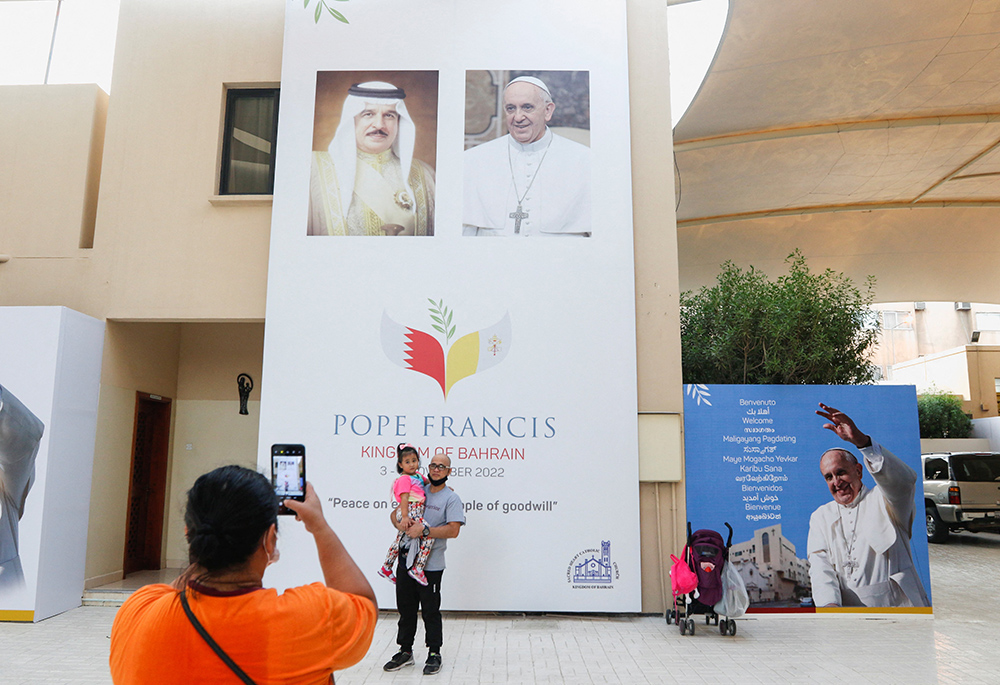
A visitor takes photo in front of a welcome banner Oct. 30 at Sacred Heart Catholic Church in Manama, Bahrain. The church is one of the places Pope Francis will visit during his Nov. 3-6 trip to Bahrain. (CNS/Reuters/Hamad I. Mohammed)
"But to have a second visit from the Holy Father in a three-year period is of great encouragement to them," he told NCR, referring to Francis' 2019 visit to the United Arab Emirates.
During his second day in the country, Francis will visit the newly consecrated Our Lady of Arabia Cathedral, which is now the largest Catholic cathedral in the Persian Gulf, for an ecumenical prayer service. On Nov. 5, Francis will celebrate a Mass for an estimated 20,000 attendees at the Bahrain National Stadium.
While the country has a small local population of Catholics, the vast majority of Catholics come from other countries who reside in Bahrain for work, especially those from Sri Lanka, India, the Philippines and other surrounding Middle East countries.
Hinder said that along with feeling forgotten or "spiritually starved," many of these Catholics feel insecure, "wondering whether next year will I still be here or will I have to look for another future?"
He hopes the visit will provide yet another occasion for the pope to remind Catholics and Muslims alike that all of their lives are better improved through living alongside each other in shared friendship.
"This is not to have a mixture of religions," said Hinder, "but to have a certain basis of common action when there is the question of how to deal with important questions of the future of humanity."
"Pope Francis has a vision, and he wants it to be realized," he added.





